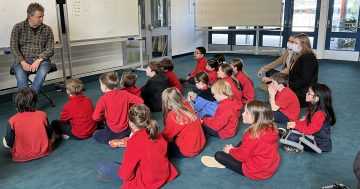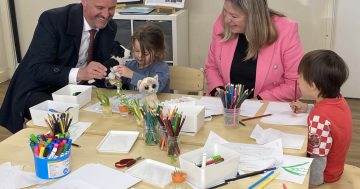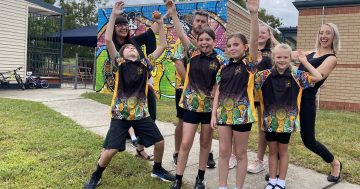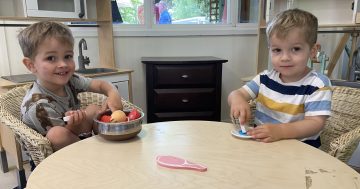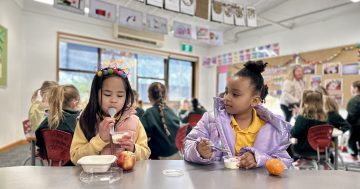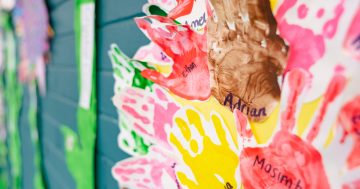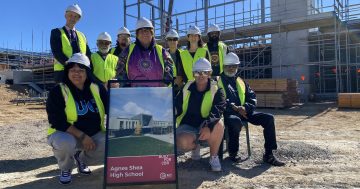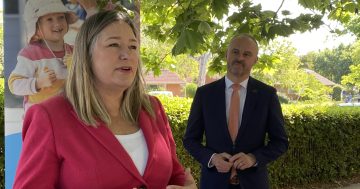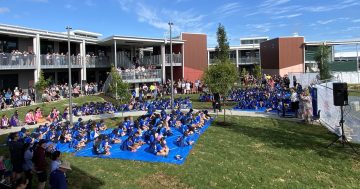
Koori Preschool children at Ngunnawal Primary School are excited to have more friends join them through an expansion of the initiative. Photo: Claire Fenwicke.
More of Canberra’s Indigenous young children will have the chance to connect with their culture during education via an expanded Koori Preschool program.
From the start of 2024, 100 extra places will be available for Aboriginal or Torres Strait Islander-identifying children at three of the Territory’s five Koori preschools – Ngunnawal Primary School, Narrabundah Early Childhood School and Richardson Primary School.
The majority of extra spaces will be at Ngunnawal Primary School where teacher Belinda Rawlinson is excited to give more Indigenous children the chance to engage with their culture through learning.
“We have a range of children who come here, so we have children who have a great connection to family and culture and have had a very strong upbringing in regards to [their culture],” she said. “But we also have families who lost that connection, and so this is a starting point for them.
“We have found that some of the children who come to Koori Pre, when they then go to their end-of-week class or mainstream class, they’re often sharing what they’ve learned about with the other groups and non-Indigenous children [at the school].”
The Koori Preschool program offers Indigenous children aged 3 to 5 years 15 hours a week of culturally-focused learning, on top of the government-subsidised preschool hours, including the new initiative to give three-year-old children one free day of preschool a week.
Education Minister Yvette Berry said the spaces were only being offered to three of the five preschools running the program due to space constraints.
“These [three preschools] are places where we have the actual physical opportunity to provide those additional spaces, but we’re looking to expand it into the future,” she said.
Quality early childhood education is the key driver behind the program, but it also offers families the chance to become more engaged in the education system.
“That’s what we’ve heard helps with engaging families and young people,” Ms Berry said. “When they can talk about and understand and be part of their culture from early education up, it really leads to building confidence in those young people and families.”
Other benefits of providing free early childhood education include reduced interaction with the justice system, building social connections and confidence, and enabling more parents to get back into the workforce.
Ms Berry said this was what made it especially important to offer extra opportunities to those in our society who may not otherwise receive them.
“[It] means they have at least an equal chance of the same start of their early learning as other families would in the ACT, and that’s really important to improve equity in our education system,” she said.
Ms Rawlinson has seen the increased engagement and positive outcomes of the program first-hand.
“It’s been great for the three-year-olds who came last year to be able to become confident this year as the four-year-olds, sharing their knowledge they learned through last year and this year,” she said.
“[They] have so much pride about themselves and about their culture, their heritage and where they’re from.”
Each preschool offers various cultural activities and learning opportunities, such as Ngunnawal language through song, learning about the meanings behind the Aboriginal and Torres Strait Islander flags, and taking what is seen in books into their excursions, such as ochre painting.
“The Koori Pre children [here] have been leaders among the whole preschool cohort in showing the other students how to grind the rocks, how to make the powder, how to add the water, and were very proud in adding the ochre paints they made out on Country, onto their faces,” Ms Rawlinson said.
“It’ll be great to be able to have more students coming in and being proud of who they are and their cultural connection.”
Parents and carers can enrol Aboriginal and Torres Strait Islander children in Koori Preschool by calling 6207 1106, emailing EduKooriPre@act.gov.au or heading online for more information.












